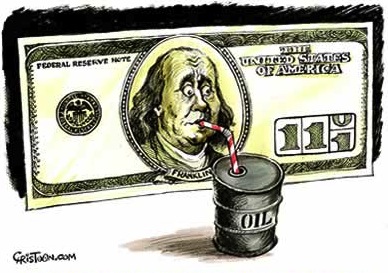While the EU is far away from perfect projects (people have their faults, so they are unable to build perfect projects) it brought stability and good living standards to Europe – first in the 1950s until the beginning of 1990s in the Western Europe and from then onwards also in the Eastern Europe (which was until the fall of Berlin Wall in the Soviet’s Sphere of Influence).
Initially, the project EU was fully supported and sponsored by the US. It was in their interest to have a strong European ally – with whom they would be able both to rely on as well as to exploit Less Developed Countries (LDCs) in the Middle East and Asia, as well as co-exist in relative “the new cold war peace” with Russia.
However, over the years Europe, represented by the EU and with its successes driven by the tandem of Germany & France, grew too strong for its US ally.
There were at least the following three aspects that represented danger for the US interests.
First, as the result of the US-UK driven financial crisis of 2008, the oil countries indicated they could consider switching trading oil currency from US Dollars to Euro.
Second, the EU with its German & French exports outside the EU – which are traditionally countries of US corporatocracy interests – started to take significant share of business away from US businesses (car industry, heavy machinery, energy and utilities, building & construction, Information Technology).
Third, the TTIP deal that would allow US businesses to access & exploit the EU single market was going nowhere and unlikely to be pushed through.
Add to the equation that in the recent years there are renewed ambitions of Russia to strengthen influence or outright annex some of their former countries (Eastern Ukraine and Crimea).
For just all these reasons alone (and for a lot more of course), it was time for the US corporatocracy to start weakening EU. There are easy means to achieve this. Focus on the vulnerable countries, such as Greece, Italy, Portugal, Spain, or surprisingly the heart of EU – Belgium.
This was job easy to be done by influencing leaders across the political spectrum in those countries to apply the indulgent and irresponsible Keynesian-like policy of government debt-driven spending. The financial problems and resulting calls for austerity had direct effect on whether the EU single currency Euro was to survive or not.
Fortunately for the EU and Euro, the economic engine of France and Germany was able to cope with (especially) the “Grexit” financial crisis quite well. Whether or not keeping Greece as part of the Euro single currency was a good move for the country remains to be seen in the future.
As the project “break the Euro” was not (yet) successful, the next available possibility to take on the fragile unity of the EU was the “BREXIT” referendum in the UK.
This was a logical next step. The UK historically has had its special relationship with the US. The UK policy towards EU and Euro was – in diplomatic speak – only lukewarm and very reserved for most of its EU membership years.
The fragile majority of “EU remainers camp” in the UK was easy to influence. The project brexit was to benefit from the media-fueled fear among Brits from the Syrian refugee crisis (which was heavily influenced by Russian involvement in Syria – to weaken Europe so that EU calls off sanctions against Russia).
Therefore, to win brexit referendum was an easy task – spread fear and rage against immigrants and immigration, feed the frustration of the decimated lower middle class by the effects of the financial crisis from 2008 – 2015 during which the UK economy held on to at least stagnation (courtesy of the BoE life-support for the UK economy via close to zero base interest rate).
As we all know, the project brexit was successful. As if that alone was not enough, later in 2016 the US voted for a president who is openly nationalist, protectionist and corporatocracy-made-up businessman.
During his era, we are about to experience strengthening the special US-UK relationship. This is why the UK government can now openly go for hard EU Brexit. They will most likely get their version of a TTIP free trade deal with the US anyway.
The effect of financial turmoil in South EU countries, the BREXIT and the US presidency of Trump on Europe remains to be seen.
What is clear nowadays is that US interests and dominance of corporatocracy on world economy is saved for now. It is sure that due to the EU and Euro difficulties the oil countries will not go for replacing the US dollar as the oil currency.


0 responses to “Breaking the EU for saving the “PetroDollar” oil currency”